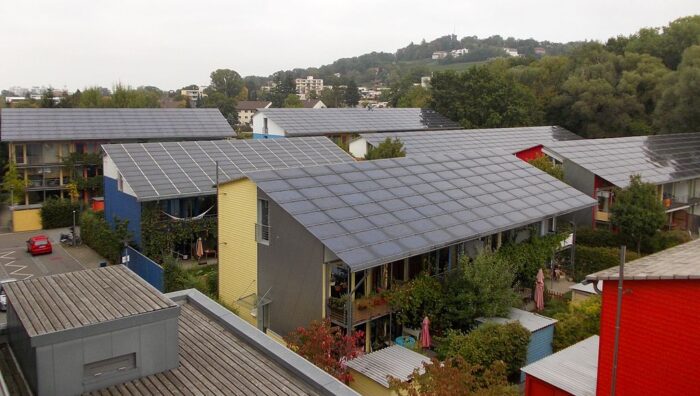
Addressing Code Obstructions to Off-Grid Development
November 26, 2024Photo: Arnold Plesse, CC BY 3.0, via Wikimedia Commons
Local Agencies’ Role in Facilitating Off-Grid Housing Development
A broad-scale transition to clean energy is essential to mitigate the effects of climate change by reducing carbon emissions from fossil fuels. Deployment of distributed energy resources, such as solar panels with batteries, in new or existing residential developments can help with the move away from carbon-intensive fuel sources. Many residential property owners in the state have already made the transition to distributed energy resources, in most cases maintaining their connection to the electric grid as secondary or supplemental energy source. However, some homeowners may want to make a clean break from the grid, whether because the cost of grid connection is high, or because they do not want to participate in the generation and consumption of non-renewable energy. For these owners, local agencies can support these efforts by removing obstacles to fully off-grid housing development in their jurisdictions.
The California Electrical Code recognizes that solar photovoltaic (“PV”) systems do not need to be connected to the utility electric grid and may instead supply power “independent” of the grid. However, codes in some California jurisdictions require connections to utility providers, inadvertently constraining off-grid development.
For example, one jurisdiction on the San Francisco Peninsula appears to require primary dwelling units in urban lot splits and two-unit projects be connected directly to utility service providers. Similarly, an Orange County jurisdiction appears to require all accessory dwelling units and junior accessory dwelling units to connect to public utilities or their equivalent including water, electric, and sewer services.
To overcome possible obstacles to off-grid energy production, jurisdictions can revise their ordinances to remove inadvertent or outdated connection requirements. Rather than requiring connections to utilities, codes can be amended to instead require that power be provided in these units, regardless of connectivity to the grid. These amendments could enhance clarity and streamline the process for developers and property owners who hope to build or retrofit units to generate 100% of their own power, making it easier to create off-grid sustainable housing.
Jurisdictions can also establish an off-grid policy to provide developers with clear guidance on standards for off-grid development. For example, in 2021, predominantly rural and sparsely populated Nevada County published a guidance document setting forth requirements and specifications for complying with County Building Department policy and the state Building Code, including that standalone systems must provide at least three days of “autonomy” based on daily winter electrical usage.
Jurisdictions must also at a minimum ensure that any off-grid policy they develop is consistent with the state Building Code and Electrical Code, and applicable California Public Utility Commission decisions and regulations.
Benefits of Clearer Standards for Off-Grid Housing
Eliminating barriers in existing code sections and providing clear guidelines for off-grid housing development could empower more individuals to pursue off-grid solutions. This approach will not only help developers navigate jurisdictional standards more easily but also promote broader opportunities for sustainable living.
For more information on best practices and compliance with applicable law when drafting an off-grid policy, please contact Joseph D. “Seph” Petta. Special thanks to law clerks Julia Larkin and Mackenzie Paskerian for their assistance in drafting this article.